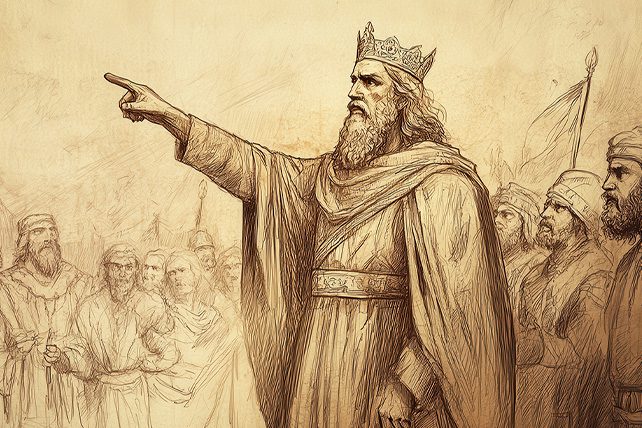From the world’s perspective, strength is a universally and undisputedly positive quality. It’s admired in every realm of life—from the successful business leader to the Olympic athlete. And it brings with it the utmost honor and prestige. But God tells us something different. He tells us the flesh is weak.
The Flesh Is Weak…So Choose God’s ‘Weakness‘
When it comes to our spiritual health and fruitfulness, strength can very quickly become our greatest enemy. Whether you are a pastor, business leader, father, mother or young person, no one is immune from the natural tendency to rely on our own strength. Rather than humble dependence on God, we choose to rely on our own wisdom, or previous success, or mere resilience, in the face of adversity.
But God’s word reminds us all that we must stay weak. If we choose to forsake His way in this and forget that the flesh is weak, we do so to our own destruction.
The Flesh Is Weak: A Royal Example
It was said of the leadership of King Uzziah, the tenth king of Judah, “the Southern Kingdom was raised to a condition of prosperity that it had not known since the death of Solomon.” Uzziah became king at 16 years of age after the assassination of his father. The Bible recounts, “And he did what was right in the sight of the LORD, according to all that his father Amaziah had done” (2 Chronicles 26:4). As a result, “God helped him” (26:7) against Judah’s strong enemy armies and “his fame spread as far as the entrance of Egypt, for he became exceedingly strong” (26:8). His army grew to 300,750 troops who “made war with mighty power, to help the king against the enemy” (26:13). “So his fame spread far and wide, for he was marvelously helped till he became strong” (26:15).
Becoming Strong
Notice that last phrase again; God helped him “until he became strong.” Now look at the next statement in the biblical account: “But when he was strong his heart was lifted up, to his destruction, for he transgressed against the LORD his God.” Clearly, Uzziah’s power and achievements went to his head. He noticed that the pagan kings of Egypt enjoyed both the royal and the priestly functions. Uzziah, dissatisfied with royal power, now wanted divine power like the other kings of the other religions. However, Egypt’s gods were not the same as the Holy One of Israel, who required that only the consecrated priests offer up the incense in the temple service. Still, Uzziah entered the Temple to burn the priestly incense with complete disregard for God’s standards.
The Bible tells us that “Azariah the priest with 80 other courageous priests of the LORD” confronted Uzziah, saying, “Leave the sanctuary, for you have been unfaithful; and you will not be honored by the LORD God” (26:17 & 18). Angered by their resistance and undaunted by their words, the king proceeded in his headstrong disregard for things holy. Immediately, he was stricken with leprosy and left the temple to live the rest of his life in shame as a lonely leper.
The Flesh Is Weak: 4 Signs That You Are Too ‘Strong’
As we review Uzziah’s gracious rise to prominence and his tragic forfeiture of God’s blessing, what can we learn? I see four lessons:
Loss of godly counsel – 2 Chronicles 26:5 tells us one of the secrets of Uzziah’s success: “He sought God in the days of Zechariah, who had understanding in the visions of God; and as long as he sought the LORD, God made him prosper.” Uzziah enjoyed the godly counsel of a prophet who instructed him in the fear of the Lord. Somewhere along the line, it appears that Zechariah died and Uzziah took a tragic turn to pride and self-will. Like Uzziah, we all need to pursue and accept the godly counsel of wise mentors during the course of our entire life. We never get beyond the blessing of courageous, biblical wisdom. If we do, we fail. Who are the “Zechariahs” in your life today? How often do you seek their advice? Do you comply?
Lack of accountability – Uzziah’s selfish aspirations soon overpowered his spiritual accountability. He even rebuffed the warnings of 81 godly priests. Power and fame can have that impact on people. They begin to believe they can “break the rules” and get away with it. Learn from Uzziah. No one ever gets so successful, famous or powerful that he can play “fast and loose” with God’s holiness and get away with it. How willing are you to submit to godly counsel when it goes against what you want or think you deserve?
Love for perceived privileges – Psalm 62:10 warns, “If riches increase, do not set your heart on them.” Like seawater, power and affluence demand that you keep drinking more, to your own eventual demise. Uzziah could not be content with life in Judah; he wanted what other kings had. Truly, there is always someone out there with more prominence, possessions, talent or toys. Godliness with contentment is great gain (1 Timothy 6:6). Discontent can undermine our godliness and our welfare when we seek privilege over piety. Has God blessed you with more than you deserve? Cherish these blessings humbly. Hold them loosely. Never compare or aspire for more than God grants or wills for you.
Lethargy toward the holiness of God – Ultimately, it seems Uzziah’s success became his idol, completely eclipsing his grasp of the holiness of God. He became more interested in exercising his royal rights than doing what was right in the sight of a holy God.
Uzziah’s success disintegrated in an instant. Fame was replaced by shame. His successful reign as king was permanently corrupted by his ruin.
Yet, God’s holiness remained. This is underscored by the riveting account of Isaiah 6:1-8. You’ve read it before. With the context fresh on your mind, read it again, carefully please…

